Research & art
Try yourself in the role of a researcher of contemporary arts! By connecting different scientific and artistic approaches and by using modern technologies, study and explore different processes in nature.
Program
During the camp, daily workshops will be organized, where participants will make various scientific tools which can be used also in art and science – a mud battery, a DIY sound system and a spectrometer. They will also learn about creative and sustainable approaches to use invasive plants, and learn the basics of Arduino programming. Under the supervision of experienced mentors, they will assemble and test these tools, get acquainted with their operation (basics of electronics and programming) and practical use (field trips).
Lots of fun, sports and creative activities included! Some of the most interesting activities will be: rowing on a beautiful lake, climbing, archery, walking to Pristava home with Zois tree park, dinner by the campfire and baking bread, hand-making souvenirs, fishing, board games and fun matches, search for extinct animals…
Program goals
Through the research concept of the camp, we want to bring primary school pupils closer to the field of contemporary research arts (concepts such as DIY (do-it-yourself), DITO (do-it-together), citizen science, bio-art), science and modern technologies (DIY electronics, programming), with emphasis on sustainable and ecological content, renewable energy and bringing awareness that we share the planet with other beings.
Equipment
No extra previous knowledge is required to participate in the camp. Organizers will take care of all the necessary tools and materials.Participants can bring their own headphones and phone charger (USB adapter). At the end of the camp all products remain to the participants. One of the workshops will be held in English – if necessary, translation into Slovenian language will be provided.
Individual workshops
Saša Spačal: Light reader
In the workshop, participants will assemble a simple tool to trigger sound with light – the light reader that consists of mechanical part that allows light control with perforated discs, and electronic part consisting of two integrated circuits that generate sound according to the light intensity.
As part of the workshop, participants will learn soldering, basics of electronics and sound, mentor will also present the possible sound use of a synthesizer in relation to light.
Zavod 404: Spectrometry
How do we see colors? How do we perceive them with our eyes and brain, how do we see them with tools? Young participants will search for answers at a spectroscopy workshop. Through experiments, participants will learn about the basic phenomena of optics, refract light, mix colors, and observe reflections. Each will make their own spectroscope and use it to observe the spectra of light. We will find out what is the salad’s favorite spectrum and why we see it green.
Julian Chollet: Electricity from the soil
Participants will build fuel cell-battery from microbes that live in the ground and test it (using LED lights). The workshop combines different fields of science – microbiology, chemistry, electronics, etc. – with DIY artistic approach and technology.
Tara Pattenden, Rea Vogrinčič and Lovrenc Košenina: TEENSYnth
At the workshop we will experiment and explore the sound options derived by Teensy board 3.2. By adding some basic electronic components to Teensy board, we will assemble an electronic sound machine with two oscillators. Many useful information for beginners, such as how to create an oscillator with the Teensy sound tool or how to adjust Arduino code so that you can freely add potentiometers or-apples!
Institute Permanent: Innovative use of invasive plants
Invasive plants once traveled the world through hands of curious scientists, but today, as blind travelers, they move with the help of diggers, cars, and cargo ships. Due to their rapid spread, they can cause ecological problems. Instead of destroying them, we will learn how to make innovative products for home use from their biomass.
